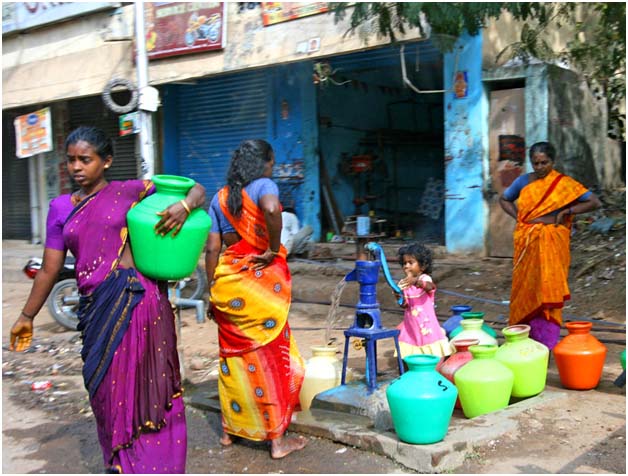Geogenic Contamination
A framework for rural drinking water quality management, based on experiences from the voluntary sector - A learning document by Arghyam
Posted on 20 Apr, 2012 04:33 PMThe phases that have been identified for a sustainable WQM programme are:
(1) Assessment of baseline situation
(2) Participatory planning
(3) Water quality monitoring
(4) Implementation
Thousands of students across India test groundwater for fluoride on March 22, 2012
Posted on 21 Mar, 2012 09:17 AMQuantitative data on water quality: A compilation of papers that present physico-chemical analyses of various water sources in India
Posted on 24 Feb, 2012 08:31 AMAssessment of physico-chemical quality of groundwater in rural area nearby Sagar city, Madhya Pradesh
This paper presents the results of forty groundwater samples collected from June 2007 to July 2010 in Gambhira and Baheria villages in Madhya Pradesh. The authors conclude that the ground water quality is degraded due to anthropogenic causes.
Prevalence of dental fluorosis and associated risk factors in school children from Kanyakumari district, Tamil Nadu - Paper published in the Indian Journal of Dental Research
Posted on 22 Feb, 2012 01:51 PMA total of 1800 children from all the nine blocks of Kanyakumari district from 6th to 10th standard were examined using type III examination. Dental fluorosis was present 15.8% of the study population and varied from as low as 1.4% to as high as 29.4% in different areas. There was a significant difference in dental fluorosis levels between rural and urban residents.
An ecological quantification of the relationships between water, sanitation and infant, child, and maternal mortality - Paper published in the Journal Environmental Health
Posted on 21 Feb, 2012 03:30 PMA number of studies have made associations between prevention of disease burden among populations by improving water supply, sanitation, hygiene and management of water resources and between poor water quality and disease burden.
Safe water dissemination workshop by PATH held on January 19-20, 2012 at New Delhi
Posted on 07 Feb, 2012 10:15 PMGuest post: Amita Bhaduri
Through the Safe Water Project, it is seeking complementary solutions to sustainability and scale-up by exploring the potential for commercial enterprises to produce, distribute, sell, and maintain Household Water Treatment and Storage (HWTS) consumer products to low-income populations. The workshop shared learnings and tools from PATH’s Safe Water Project and presented the experiences of other organizations that are leveraging market-based approaches to achieve a sustainable public health impact.

Nutrient-based fertiliser subsidy: Will farmers adopt agricultural best management practices? An article in EPW
Posted on 06 Feb, 2012 11:58 AMIt offers prospective benefits from the agro-environmental management point of view.
Solar and wind based freshwater, saltwater and brackish water purification systems
Posted on 05 Feb, 2012 07:12 PMArticle Courtesy: Trunz Water Systems
Global change, wastewater and health in fast growing economies - Paper published in the journal Current Opinion in Environmental Sustainability
Posted on 02 Feb, 2012 11:35 AMIt argues that among the water challenges in the 21st century, the water quality health nexus is one of the most serious challenges that will need to be addressed at an urgent level.The paper directs attention at the rapid and unequal growth and development patterns emerging in developing economies and the impact of this development on the environment and human populations. The paper directs attention to the negative impact of this development on one of the important natural resources such as water and the linkages between water quality and public health of populations.
"International Conference on Water Quality with Special Reference to Arsenic", February 18-20, 2012, Kolkata
Posted on 02 Feb, 2012 11:20 AMOrganizer: Public Health Engineering Department, Govt. of West Bengal,
Ministry of drinking Water and Sanitation, Govt. of India
Description:
Public Health Engineering Department, Government of West Bengal in collaboration with Ministry of Drinking water and sanitation, Government of India is organizing an “International Conference on Water Quality with Special reference to Arsenic” in Kolkata on February 18-19, 2012 followed by a field visit on February 20, 2012. The meeting is being supported by several International agencies like WHO, UNICEF, World Bank-WSP, UNU and others. We expect several renowened National, International experts & participants to be there.






